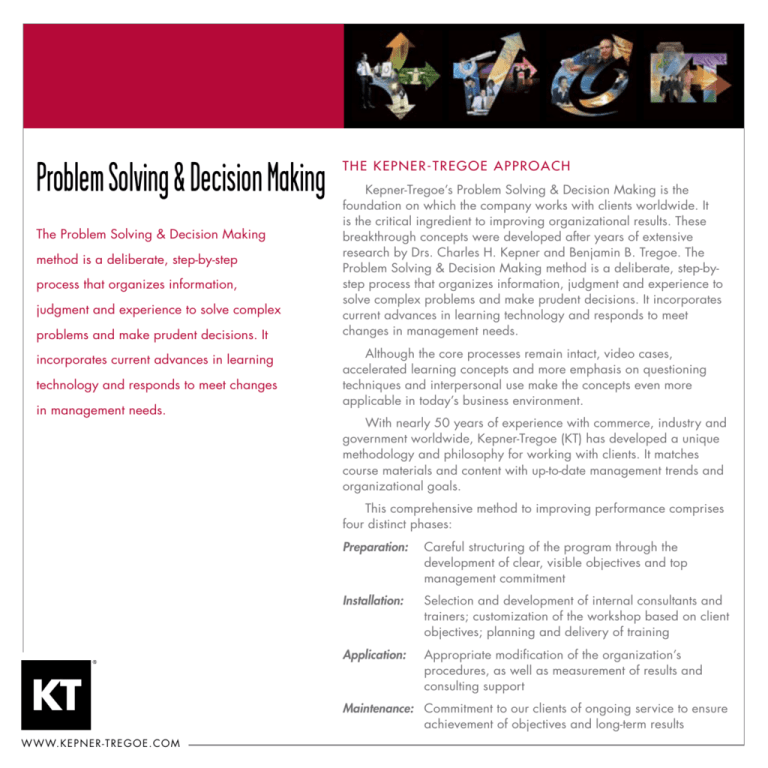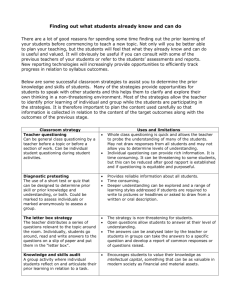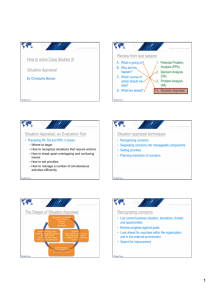
Problem Solving & Decision Making
The Problem Solving & Decision Making
method is a deliberate, step-by-step
process that organizes information,
judgment and experience to solve complex
problems and make prudent decisions. It
incorporates current advances in learning
technology and responds to meet changes
in management needs.
The Kepner-Tregoe Approach
Kepner-Tregoe’s Problem Solving & Decision Making is the
foundation on which the company works with clients worldwide. It
is the critical ingredient to improving organizational results. These
breakthrough concepts were developed after years of extensive
research by Drs. Charles H. Kepner and Benjamin B. Tregoe. The
Problem Solving & Decision Making method is a deliberate, step-bystep process that organizes information, judgment and experience to
solve complex problems and make prudent decisions. It incorporates
current advances in learning technology and responds to meet
changes in management needs.
Although the core processes remain intact, video cases,
accelerated learning concepts and more emphasis on questioning
techniques and interpersonal use make the concepts even more
applicable in today’s business environment.
With nearly 50 years of experience with commerce, industry and
government worldwide, Kepner-Tregoe (KT) has developed a unique
methodology and philosophy for working with clients. It matches
course materials and content with up-to-date management trends and
organizational goals.
This comprehensive method to improving performance comprises
four distinct phases:
Preparation:
Careful structuring of the program through the
development of clear, visible objectives and top
management commitment
Installation:
Selection and development of internal consultants and
trainers; customization of the workshop based on client
objectives; planning and delivery of training
Application:
Appropriate modification of the organization’s
procedures, as well as measurement of results and
consulting support
Maintenance: Commitment to our clients of ongoing service to ensure
achievement of objectives and long-term results
www. ke pner-tregoe. co m
Kepner-Tregoe’s Problem Solving
& Decision Making Workshop
The processes
The fundamental processes learned in the workshop are:
Situation Appraisal:
Teaches participants to look at the whole picture by identifying
and evaluating overall concerns. The concerns are broken into
manageable issues and prioritized. A plan is developed for the
effective resolution of the issues including what analysis is required
and who needs to be involved.
Problem Analysis:
Teaches participants to resolve problems by first defining the
problem in detail. Possible causes are identified and then tested
against the “problem definition.” Participants verify the true cause of
a problem before taking expensive corrective action.
Problem Analysis
Describe Problem
Identify Possible Causes
Evaluate Possible Causes
Confirm True Cause
Situation
Appraisal
Identify Concerns
Decision Analysis
Clarify Purpose
Evaluate Alternatives
Set Priority
Assess Risks
Plan Next Steps
Make Decision
Plan Involvement
Potential Problem
(Opportunity) Analysis
Identify Potential Problems (Opportunities)
Identify Likely Causes
Take Preventive (Promoting) Action
Plan Contingent (Capitalizing)
Action and Set Triggers
Decision Analysis:
Teaches a decision-making procedure that is applicable when the
choice between alternatives is unclear. Participants learn to clarify
the purpose of the decision and form clear objectives. In addition,
they evaluate possible courses of action and assess related risks prior
to making a decision. This process becomes a powerful common
language for promoting effective decision making throughout an
organization.
Potential Problem Analysis and Potential Opportunity Analysis:
Teaches participants to anticipate potential problems and
opportunities and their likely causes. Participants develop preventive
or promoting actions to protect or enhance a plan, and implement
the appropriate contingent or exploiting actions, if required.
Learning Objectives
Learning Design
Completion of the KT Problem Solving & Decision
Making workshop enables participants to:
KT has refined its proprietary instructional design through years of
experience and now has taken advantage of client suggestions and
improved learning techniques. The program:
• Understand the basic steps of Situation Appraisal,
Problem Analysis, Decision Analysis, Potential
Problem Analysis, and Potential Opportunity
Analysis
• Question incisively and listen intently to access
relevant information
• Interact more effectively as a team through use of
a common approach and language
• Recognize when participation from others is
needed to create commitment or enhance the
quality of a solution
• Understand techniques for managing conflict and
reaching group consensus
• Apply the concepts to work-related concerns in
order to achieve organizational results
• Provides a stimulating environment based on adult learning
principles to maximize skill transfer
• Uses competency-based instruction, with video and paper-based
case practice and on-the-job application, and encourages
participant self-evaluation and workshop leader assessment of
learning
• Dedicates over 60 percent of the workshop to case practice and
on-the-job application
• Provides instructor presentations and video segments that offer
valuable information and models of desired behavior for learners
to discuss and emulate
• Is approved by the American Council on Education for upperlevel college credit, is recommended by the Project Management
Institute for professional development units, and is government
accredited as “Nationally Recognised Training” in Australia.
Workshop Flexibility
The workshop can be customized to meet the needs of different management and executive levels, as well as
professional and staff specialists and key support personnel through variations in the program structure and
content, including:
• The number and content of the case studies used and the emphasis on team or individual on-the-job application
• The sequence in which the learning modules are presented and the depth to which each process is covered
• The use of structured application sessions, covering optional topics such as: influencing others, making
recommendations and objectively handling people problems
• Duration of almost any length, including a three-day workshop (page 6) and a comprehensive, five-day
workshop (page 7)
Problem Solving & Decision Making
Standard Four-Day Workshop
D ay O n e
D ay T w o
Focus on Situation Appraisal and Problem Analysis
Focus on Problem Analysis
Opening Briefing
1.0
Process Overview
Introduction
Questioning Discovery
SA Teach
2.0
PA Introduction
PA Discovery
3.0
PA State & Specify Teach
5.0
PA Basics
PA Basics Practice
(Specification)
PA Evaluate & Confirm Teach
6.0
7.0
8.0
PA Basics Practice
(Finish Spec & Test)
PA Application
(Spec & Test)
Review & Opportunity
After the brief review of
Situation Appraisal, another
video-based demonstration
introduces Problem Analysis
(PA). Participants use the
video to explore their own
approaches to finding
cause and then a two-part,
video-based, small group
case outlines the concepts
involved in Problem Analysis.
The day closes with an
application of the principles
to work-related problems.
Day 1
0
Review Day 1
Questioning Skills Teach
1.0
2.0
Distinctions & Changes
Practice (Specification)
Distinctions & Changes Teach
3.0
Distinctions & Changes
Practice (Evaluate & Confirm)
4.0
PA Questioning Practice
5.0
PA Application (Full Process)
6.0
7.0
8.0
PA Questioning Practice or
Group Questioning Practice
Review & Opportunity
Day 2
F o u r - D ay W o r k s h o p A p p r o x i m at e T i m e A ll o c at i o n ( h o u r s ) :
Presentation 12.50
Case Practice 9.75
Application 9.75
Distinctions and Changes
4.0
PA Demo
The workshop opens with a
quick overview of objectives,
participant introductions and
workshop administration.
Through the use of a videobased, group exercise,
participants identify their
current questioning skills
and methods for handling
complex situations. The
basics of Situation Appraisal
(SA) are introduced as a
systematic process to gather,
sort and organize information.
As a demonstration of the
benefits, a video presents a
complicated and emotional
situation that is rationally
separated into actionable
concerns.
Questioning
Skills
0
Participants review and discuss
learning points from the first
day. A two-part case study is
used for additional practice of
the problem-solving techniques,
and participants develop skills
for asking and answering
incisive questions. Effective
questioning techniques are
demonstrated in a video as a
critical part of effective problem
solving. During the second
part of the case, participants
learn to use the distinctions
and changes of a problem to
develop possible causes.
Additional case studies focus
on a practice of effective
questioning techniques.
Each participant attempts to
gather relevant information
from another in order to
define a problem and
generate causes. Full group
practice of questioning
skills is also an option.
During the final portion
of the day, discussions
of on-the-job application
are structured to meet
specific needs of individual
participants and the group.
O p t i o n al M o d u l e s
Optional modules, designed to meet additional client needs, include the following:
The Creativity Module emphasizes the need for original ways Statistical Problem Solving integrates the KT Problem Solving &
to approach difficult challenges. It presents creative thinking Decision Making process with the organization’s approach to
techniques and applies them within the KT Problem Solving & statistical process control.
Decision Making framework.
D ay T h r e e
D ay F o u r
Focus on Decision Analysis, along with presenting
and assessing recommendations
Focus on Potential Problem Analysis, Potential Opportunity
Analysis, questioning and listening skills, Situation Appraisal
and transferring the skills to the job
0
Review Day 2
DA Clarify Purpose Teach
1.0
DA Application (Choose Alone)
4.0
5.0
DA Techniques Teach
DA Techniques
6.0
7.0
8.0
Review & Opportunity
Day 3
PPA/POA Practice
2.0
3.0
PPA/POA Application
(Single Action)
PPA Techniques Teach
PPA/POA Application
(Techniques)
4.0
Listening Teach
Questioning & Listening
Exercise
5.0
SA Review & Teach
SA Exercise
6.0
7.0
8.0
SA Application
Final Planning
Summary & Evaluation
Day 4
Final Planning
Present & Assess
Recommendations Teach
1.0
SA Review
DA Application
(Choose in Group)
The day concludes with an
instructor teach and exercise
on presenting and assessing
recommendations using the
Decision Analysis concepts. A
video segment illustrates the
benefits of effectively presenting
and assessing recommendations
with the Decision Analysis
format and participants discuss
the importance of consensus—
when it’s appropriate and
how to manage a consensusseeking meeting.
PPA/POA Basics Teach
Listening
Skills
Decision Analysis refinements
are presented to prepare
participants for application
of the concepts in specific
settings. Additional time is
provided for full-group Decision
Analysis application.
Review Day 3
PPA Techniques
DA Practice
(Alternatives & Risks)
DA Basics
3.0
DA Evaluate & Choose Teach
0
PPA Basics
2.0
DA Practice (Objectives)
Participants review and discuss
learning points from the first two
days. The basics of Decision
Analysis (DA) are then presented
and participants apply the stepby-step methodology during
a two-part video simulation.
The skills are then applied
to work-related concerns
and participants receive
feed back and additional
insights from the instructor.
Participants quickly review and
discuss learning points from the
first three days and begin work on
Potential Problem and Opportunity
Analysis (PPA/POA). Potential Problem
Analysis offers participants a method
for protecting their decisions and
actions, while Potential Opportunity
Analysis uses similar methods to
capitalize on future situations.
Participants discuss the potential
pitfalls and benefits of implementing a
recommendation to practice Potential
Problem/Opportunity Analysis.
Potential Problem/Opportunity Analysis
are applied to actual job-related
concerns. Coaching and feedback
is provided by the instructor. Next, a
video engages participants with a
demonstration of the use of Potential
Problem Analysis under time pressure.
Participants utilize listening techniques
to spot vague or missing information.
Situation Appraisal is reviewed
and refinements are presented.
An instructor-led exercise allows
participants to practice separating and
clarifying vague concerns. Situation
Appraisal is then applied to individual
job-related concerns. An instructor-led
discussion focuses on using the process
to achieve results and participants plan
for the ongoing use of each process.
Problem Solving & Decision Making
Three-Day Workshop
0
D ay O n e
D ay T w o
D ay T h r e e
Focus on Situation Appraisal
and Problem Analysis
Focus on Problem Analysis
and Decision Analysis
Focus on Potential problem Analysis and
Potential Opportunity Analysis, questioning
and listening skills, Situation Appraisal and
transferring the skills to the job
0
1.0
Questioning Skills Teach
1.0
Distinctions & Changes Teach
PA Discovery
3.0
PA Demo
Distinctions & Changes
Practice (Evaluate & Confirm)
2.0
3.0
PPA or POA Application
(Single Action)
PPA Techniques Teach
PPA or POA Application
(Techniques)
4.0
PA State & Specify Teach
5.0
Day 1
7.0
8.0
DA Practice
(Alternatives & Risks)
DA Application
(Choose in Group)
Review & Opportunity
SA Exercise
6.0
7.0
8.0
SA Application
Final Planning
Summary & Evaluation
Day 2
Day 3
T h r e e - D ay W o r k s h o p A p p r o x i m at e T i m e A ll o c at i o n ( h o u r s ) :
Presentation 10.75
Case Practice 7.75
Application 5.50
Final Planning
Review & Opportunity
6.0
SA Review & Teach
SA Review
8.0
PA Application
(Spec & Test)
5.0
DA Evaluate & Choose Teach
Listening Teach
Questioning & Listening
Exercise
DA Basics
7.0
PA Basics Practice
(Finish Spec & Test)
4.0
DA Practice (Objectives)
PA Evaluate & Confirm Teach
6.0
DA Clarify Purpose Teach
Listening
Skills
5.0
PA Basics
PA Basics Practice
(Specification)
4.0
PPA Techniques
3.0
PPA/POA Basics Teach
PPA/POA Practice
Distinctions and Changes
2.0
PA Introduction
Review Day 2
1.0
Distinctions & Changes
Practice (Specification)
SA Teach
2.0
0
PPA Basics
Process Overview
Introduction
Questioning Discovery
Review Day 1
Questioning
Skills
Opening Briefing
Problem Solving & Decision Making
Five-Day Workshop
D ay O n e
Focus on Situation
Appraisal and Problem
Analysis
0
D ay T w o
Questioning Skills Teach
Process Overview
Review Day 2
Review Day 3
PA Techniques Teach
DA Techniques Teach
PA Questioning Practice
PPA Basics Teach
DA Practice (Objectives)
POA Basics Teach
PPA and POA Practice
DA Evaluate & Choose Teach
6.0
8.0
PA Basics Practice
(Finish Spec & Test)
PA Application
(Spec & Test)
Review & Opportunity
DA Application (Choose Alone)
PA Questioning Practice or
Group Questioning Practice
Review & Opportunity
Management Presentations
PPA and POA Application
(Single Action)
PPA Techniques Teach
PPA and POA Application
(Techniques)
Review & Opportunity
Review & Opportunity
PPA Techniques
7.0
DA Practice
(Alternatives & Risks)
Final Planning
Final Planning
DA Basics
PA Evaluate & Confirm Teach
PPA Basics
PA Basics
PA Application (Full Process)
Daily Activity Planning
DA Clarify Purpose Teach
Special
Applications
PA State & Specify Teach
5.0
SA Exercise
SA Application
PA Demo
PA Basics Practice
(Specification)
SA Review & Teach
Present & Assess
Recommendations Teach
Distinctions & Changes
Practice (Evaluate & Confirm)
Distinctions and Changes
4.0
Listening Teach
Questioning & Listening
Exercise
SA Review
Distinctions & Changes Teach
PA Discovery
3.0
Review Day 4
DA Techniques
PA Techniques
PA Techniques Application
PA Introduction
Focus on Situation
Appraisal, questioning and
listening skills and transferring the skills to the job
DA Application
(Choose in Group)
Distinctions & Changes
Practice (Specification)
SA Teach
2.0
D ay F i v e
Focus on Decision
Analysis, Potential
Problem Analysis and
Potential Opportunity
Analysis
Listening
Skills
Questioning Discovery
D ay F o u r
Focus on Problem
Analysis and Decision
Analysis
Questioning
Skills
Review Day 1
Introduction
Opening Briefing
1.0
D ay T h r e e
Focus on questioning
skills and Problem
Analysis
Summary & Evaluation
F IVE - D ay W o r k s h o p A p p r o x i m at e T i m e A ll o c at i o n ( h o u r s ) :
Presentation 15.25
Case Practice 9.75
Application 15.00
About Kepner-Tregoe
Kepner-Tregoe Locations
Kepner-Tregoe (KT) provides consulting and training
services to organizations throughout the world. We build
competitive advantage using powerful, systematic processes
for resolving business issues and achieving targeted
performance improvements.
Headquarters
United States
Canada
Africa, China, India,
and throughout Europe
and Southeast Asia
Since 1958, KT has studied how effective business leaders
manage difficult business challenges. We incorporated
their habits into logical, repeatable methods for rapidly
resolving problems, making decisions, planning ahead, and
managing people and projects. This world-renowned, rationalprocess approach helps maximize the critical thinking skills,
knowledge, and expertise of individuals and organizations.
France
(serving Spain)
Affiliates
Germany
Brazil
KT collaborates with many of the largest and most
successful companies in the world to improve the way
work is done and facilitate new approaches to quality,
competitiveness, cost, cycle time, business strategy, and other
issues. Many organizations integrate our systematic methods
into their business processes, embedding a common language
approach for identifying objectives, resolving issues, and
integrating change.
At a time when organizations face multiple challenges—
intense global competition, crushing growth and cost
pressures, rapid technological advances—KT plays a vital role
in helping them improve the clarity of their strategic thinking
and the effectiveness of their operations.
Australia
Hong Kong
Ireland
Japan
Malaysia
Netherlands
Singapore
Also serving:
Chile (serving Argentina)
Finland
Italy
Korea
Mexico (serving Costa Rica,
El Salvador, Guatemala,
Honduras, Nicaragua, and
Panama)
Switzerland
(serving Belgium)
Peru (serving Colombia)
Taiwan
Poland
Philippines
Thailand
Romania
United Kingdom
Venezuela
F o r m o r e i n f o r m at i o n , v i s i t u s at
w w w. k e p n e r - t r e g o e . c o m o r
e - m a i l u s at i n f o @ k e p n e r - t r e g o e . c o m
www. ke p ner-tregoe. c o m
700-10-P190306
Copyright © 2006 Kepner-Tregoe, Inc. All Rights Reserved.
KL283.k







